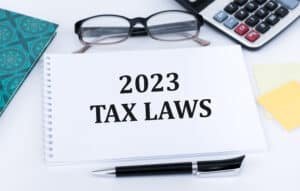Many people cringe just hearing the word taxes. Generally, taxes can feel overwhelming and complex, especially with constantly changing tax laws. Several pieces of legislation have passed on both federal and state levels, potentially bringing about changes for businesses as they file their 2023 and future taxes. Read on to learn about four crucial 2023 tax law updates and how they may impact your business.
Inflation Reduction Act
While it actually passed in 2022, the federal Inflation Reduction Act (IRA) is a 10-year plan, meaning we are still in the early implementation phases of this legislation. What has been buzzworthy is how a large portion of funding from this bill has gone to the IRS. So far, a few things we know are happening with the IRS under the IRA:
- Hiring more agents to support compliance for high-income earners, large corporations and complex partnerships – 3,700 new agents are being sought to audit and scrutinize the tax filings of individuals making over $400,000, as well as businesses/partnerships with over $10M in assets that have more than $250,000 in recognized tax debt.
- Using AI to identify prospective audits – to support its Large Partnership Compliance (LPC) program, the IRS will use machine learning and data science to select tax returns with potential or suspected compliance risk, mostly for partnerships with more than $10 billion in assets. Previously, the IRS didn’t have the manpower to do this, but AI is making it possible.
In short, businesses may be under greater scrutiny when it comes to being audited for tax filings. To prepare your business for these 2023 tax law changes as you seek to file in 2024, it’s best to connect with your accountant regularly or in advance of filing, sharing any questions or concerns about your financial statements.
Clean Energy Tax Credit
Also in the Inflation Reduction Act are several clean energy tax provisions. While businesses in sectors like real estate, manufacturing, agriculture, and energy may benefit most from IRA tax credits, most businesses can take advantage of some of the many programs, tax credits, and grants designed to protect the environment and create sustainability. Some of the more popular 2023 tax credits include:
- Investment Tax Credit (ITC): install solar panels or renewable energy systems for a credit of up to 30%
- Energy Efficiency Improvement Credit: upgrade lighting systems, improve insulation, install high-efficiency HVAC systems and more to receive a tax credit of up to $5 per square foot
- Clean Fuel Vehicle Tax Credit: receive a credit of up to $7,500 for purchasing a new electric vehicle or $4,000 for purchasing a new plug-in hybrid EV; this is especially useful for businesses with fleets
Other interesting opportunities for the Clean Energy Tax Credits under the IRA are elective pay and transferability. Essentially, a business may be able to either claim the credit and file an annual tax return to claim elective pay for the full value of the credit or transfer all or a portion of the credit to a third-party buyer in exchange for cash.
Again, to understand whether or not your business may qualify for any of these credits and to explore the elective pay and transferability options, speak to an accounting professional about improvements you’ve already made or energy investments in which you may have interest.
PA House Bill 1219
In 2022, Pennsylvania set up a plan for the reduction of the corporate net income tax rate from 9.99% to 4.99% by 2031. Recently, the PA House passed a bill (HB1219) that would accelerate the reduction to 4.99% by 2026.
If this becomes law, it will be a significant tax benefit to most businesses, raising the net operating loss deduction from 40% to 80%. However, companies will have to include their organization-wide income from subsidiaries outside of PA, and this may negatively impact those businesses.
While the bill has other benefits for individual taxpayers and the state economy, it’s still awaiting signature and passage from the Governor.
PA County Property Reassessment
With no mandatory reassessment cycle, many of Pennsylvania’s 67 counties have not done property assessments for decades – up to 50 years. As market values have changed dramatically, many counties have recently been court-ordered to conduct property reassessments to establish an accurate market value for each property and allow for fair taxation.
Counties with upcoming reassessments include:
- Lackawanna County (1968) – Effective January 1, 2026 – 107,000 parcels
- Schuylkill County (1996) – Effective January 1, 2026 – 95,000 parcels
- Mercer County (1971) – Effective January 1, 2027 – 60,500 parcels
These reassessment processes include commercial properties. If your business owns a building, be prepared to potentially pay higher taxes in the coming years, if not already. Leasing your commercial space? Even if you are not responsible for paying real estate taxes, don’t be shocked if your rent increases to help offset tax increases.
There is an appeal process to consider if you feel your reassessment is incorrect.
Guidance for 2023 tax law changes
Have questions about 2023 tax law changes? FLB’s Taxation group serves businesses and individuals in Pennsylvania and New Jersey, assisting taxpayers through a complex array of taxation issues. In addition to reviewing and implementing individual and business tax planning options and strategies, the team regularly provides guidance in identifying and reducing potential tax consequences.









